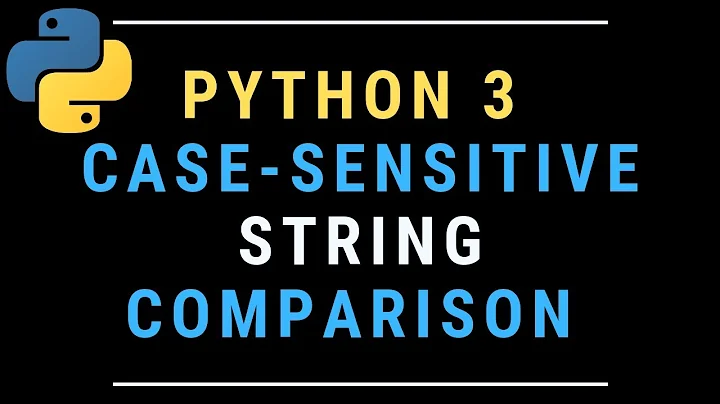Case insensitive 'in'
Solution 1
username = 'MICHAEL89'
if username.upper() in (name.upper() for name in USERNAMES):
...
Alternatively:
if username.upper() in map(str.upper, USERNAMES):
...
Or, yes, you can make a custom method.
Solution 2
str.casefold is recommended for case-insensitive string matching. @nmichaels's solution can trivially be adapted.
Use either:
if 'MICHAEL89'.casefold() in (name.casefold() for name in USERNAMES):
Or:
if 'MICHAEL89'.casefold() in map(str.casefold, USERNAMES):
As per the docs:
Casefolding is similar to lowercasing but more aggressive because it is intended to remove all case distinctions in a string. For example, the German lowercase letter 'ß' is equivalent to "ss". Since it is already lowercase,
lower()would do nothing to 'ß';casefold()converts it to "ss".
Solution 3
I would make a wrapper so you can be non-invasive. Minimally, for example...:
class CaseInsensitively(object):
def __init__(self, s):
self.__s = s.lower()
def __hash__(self):
return hash(self.__s)
def __eq__(self, other):
# ensure proper comparison between instances of this class
try:
other = other.__s
except (TypeError, AttributeError):
try:
other = other.lower()
except:
pass
return self.__s == other
Now, if CaseInsensitively('MICHAEL89') in whatever: should behave as required (whether the right-hand side is a list, dict, or set). (It may require more effort to achieve similar results for string inclusion, avoid warnings in some cases involving unicode, etc).
Solution 4
Usually (in oop at least) you shape your object to behave the way you want. name in USERNAMES is not case insensitive, so USERNAMES needs to change:
class NameList(object):
def __init__(self, names):
self.names = names
def __contains__(self, name): # implements `in`
return name.lower() in (n.lower() for n in self.names)
def add(self, name):
self.names.append(name)
# now this works
usernames = NameList(USERNAMES)
print someone in usernames
The great thing about this is that it opens the path for many improvements, without having to change any code outside the class. For example, you could change the self.names to a set for faster lookups, or compute the (n.lower() for n in self.names) only once and store it on the class and so on ...
Solution 5
Here's one way:
if string1.lower() in string2.lower():
...
For this to work, both string1 and string2 objects must be of type string.
Related videos on Youtube
Comments
-
RadiantHex almost 4 years
I love using the expression
if 'MICHAEL89' in USERNAMES: ...where
USERNAMESis a list.
Is there any way to match items with case insensitivity or do I need to use a custom method? Just wondering if there is a need to write extra code for this.
-
 fredley over 13 years
fredley over 13 yearsif 'CaseFudge'.lower() in [x.lower() for x in list] -
viraptor over 13 years
[...]creates the whole list.(name.upper() for name in USERNAMES)would create only a generator and one needed string at a time - massive memory savings if you're doing this operation a lot. (even more savings, if you simply create a list of lowercase usernames that you reuse for checking every time) -
wheaties over 13 yearsOr you could use
itertoolsfunctionimap. It's much faster than a generator but accomplishes the same goal. -
Xavier Combelle over 13 yearsthat doesn't work for dict try if CaseInsensitively('MICHAEL89') in {'Michael89':True}:print "found"
-
Gabe over 13 yearsXavier: You would need
CaseInsensitively('MICHAEL89') in {CaseInsensitively('Michael89'):True}for that to work, which probably doesn't fall under "behave as required". -
nmichaels over 13 yearsSo much for there being only 1 obvious way to do it. This feels heavy unless it's going to be used a lot. That said, it's very smooth.
-
Alex Martelli over 13 years@Nathon, it seems to me that having to invasively alter the container is the "feels heavy" operation. A completely non-invasive wrapper: how much "lighter" than this could one get?! Not much;-). @Xavier, RHS's that are dicts or sets with mixed-case keys/items need their own non-invasive wrappers (part of the short
etc.and "require more effort" parts of my answer;-). -
nmichaels over 13 yearsMy definition of heavy involves writing quite a bit of code to make something that will only be used once, where a less robust but much shorter version would do. If this is going to be used more than once, it's perfectly sensible.
-
Ryan about 11 yearsPrefer to lower all keys when building the dict, for performance reasons.
-
Iching Chang over 7 yearsJust to add, the pattern might need to be escaped, since it might contain characters like ".","?", which has specail meaning in regular expression patterns. use re.escape(raw_string) to do it
-
Jeff over 6 yearsAttributeError: 'list' object has no attribute 'lower'
-
otocan about 6 yearsif [x.lower() for x in list] is a list comprehension, is (name.upper() for name in USERNAMES) a tuple comprehension? Or does it have another name?
-
nmichaels about 6 years@otocan It's a generator expression.
-
otocan about 6 years@nmichaels thanks, just wanted to know what to google
-
User over 5 years@Jeff that's because one of your elements is a list, and both objects should be a string. Which object is a list?
-
Jeff over 5 yearsI would up vote you, but I cannot unless you edit your answer. You are absolutely right.
-
User over 5 years@Jeff I added clarification.
-
 jpp about 5 yearsThis is wrong. Consider
jpp about 5 yearsThis is wrong. Consider'a' in "".join(['AB']).lower()returnsTruewhen this isn't what OP wants.








